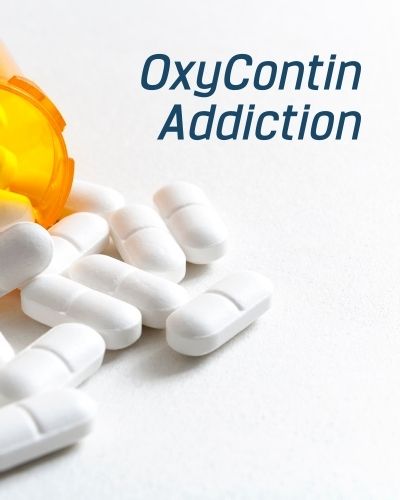OxyContin is a brand-name version of extended-release oxycodone, a powerful opioid analgesic, that causes feelings of relaxation and pain relief, and can sometimes elicit feelings of euphoria. This well-known painkiller is used to treat severe and chronic pain and extremely effective at blocking pain signals – perhaps, too effective. OxyContin’s potency can backfire as the same qualities that make it such an effective painkiller also cause it to be highly addictive. Additionally, OxyContin has a strong potential for abuse as it can induce a pleasurable high when crushed, snorted, or injected (all of which are not the way it should be administered).
These and other factors have contributed to OxyContin being one of the most widely abused prescription drugs. In a survey, nearly 1 million U.S. residents reported abusing the drug (using without medical need or in a non prescribed manner) at least once in their lifetime. The number of OxyContin prescriptions has increased at a rapid pace, nearly doubling from 2008 to 2018, and with it, so have the instances of oxycodone abuse, overdoses, and fatalities as well.

OxyContin Street Names
- Oxy
- OC
- Roxy
- Percs
- Kicker
- Oxycet
- Cotton
- Oxycotton
- Hillbilly Heroin
How It Works
OxyContin interacts with mu receptors which are involved in regulating pain and pleasure. These receptors are on nerve endings, the majority of which are located in the brain and spinal cord. When opioids bind with a receptor, they increase dopamine output, which is what sometimes results in a high. This neurotransmitter is closely tied with the part of the brain that regulates motivation and reward which is why addiction is so common. Prescription opioids like oxycodone also affect endorphin and enkephalin neurotransmitters, which are responsible for reduced pain sensitivity, alertness, and depressant effects on the central nervous system.
OxyContin is an extended-release pain reliever, a feature that prevents too much of the drug from affecting the body at once. However, crushing, snorting, or injecting the drug bypasses this mechanism and instead causes the drug to act quickly, all at once. This can cause an intense high that can quickly turn into an addiction.
OxyContin Addiction Side Effects
Many instances of OxyContin addiction are accidental, occurring even when taken as directed. While this addiction can be harmful within itself with adverse effects, risk of overdose, and withdrawal, addiction to OxyContin and other prescription drugs is often a gateway to dangerous illicit street use such as heroin or fentanyl.
- alprazolam (Xanax, Xanax XR)
- clobazam (Onfi)
- clonazepam (Klonopin)
- clorazepate (Tranxene)
- chlordiazepoxide (Librium)
- diazepam (Valium, Diastat Acudial, Diastat)
Until an OxyContin addiction has reached such severe levels as to result in an overdose, it can be difficult to distinguish if addiction is present. Individually, these symptoms aren’t particularly alarming, so it’s important to recognize clusters of these symptoms or if they are accompanied by typical addict behavior.
Signs of OxyContin Overdose
- Small pupils
- Confusion
- Dizziness
- Blurred or reduced vision
- Cold and clammy skin
- Slowed or stopped breathing
- Loss of consciousness or coma
- Seizure
- Nausea and vomiting
OxyContin Withdrawal Symptoms
OxyContin withdrawal usually kicks in about 6 to 30 hours after the last usage. There are a number of physical and mental side effects, while uncomfortable, they’re rarely life-threatening. The worst of the effects happen after 72 hours. The severity of these symptoms will vary depending on the duration of abuse and the amount last taken.
- Bone pain
- Muscle spasms
- Chills
- Extra pain sensitivity
- Insomnia
- Drooping eyelids
- Tearing
- Stomach cramps
- Nausea and vomiting
- Diarrhea
- Irregular or fast heartbeat
- Teeth chattering
- Excessive yawning
- Weakness
- Irritability
- Extreme confusion
- Anxiety
- Loss of motivation
Fortunately, there are medications like Suboxone that can help those going through opioid withdrawal. These medications are only available in a prescription and require a specially licensed medical professional. Addiction recovery centers like Level Up Lake Worth can provide this medication as part of a treatment plan.